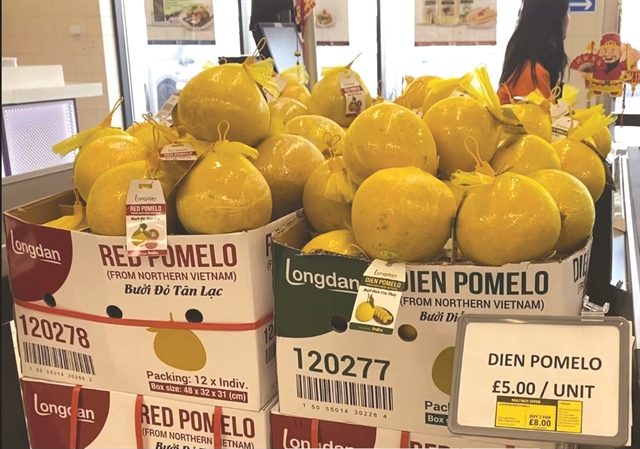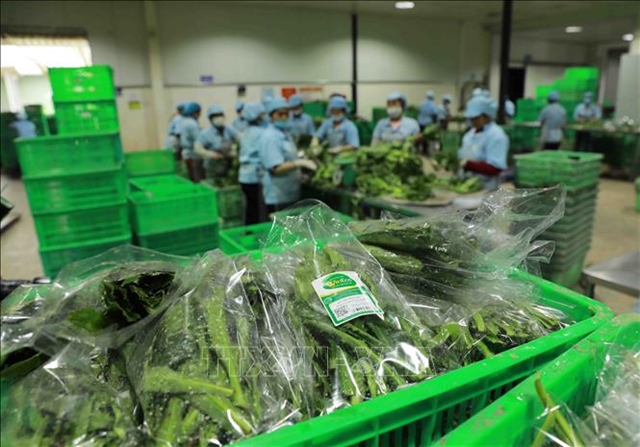Quality–based branding of fruits and vegetables to tap opportunities of UKVFTA for export expansion
The expansion of Vietnamese fruits and vegetables to the UK market has demonstrated that the country’s production capacity of farm produce is improving in terms of quality, as the UK is a very demanding market with high requirements for food hygiene and safety.

Quality and brand are recognised as decisive factors for Việt Nam’s fruits and vegetables to tap the opportunities from the UK – Việt Nam Free Trade Agreement (UKVFTA) and expand export to this highly demanding market, said Đặng Phúc Nguyên, General Secretary of Việt Nam Vegetable and Fruit Association (Vinafruit).
Under the UKVFTA, 100 per cent of tariffs on fresh and processed fruits and vegetables were eliminated on January 1, 2021.
The trade deal helped increase Việt Nam’s export of fruits and vegetables to the UK significantly in the past two years despite falling consumption demand among British consumers due to the impacts of economic slowdown and inflationary risk, Nguyên said.
He cited statistics that Việt Nam exported US$20.9 million worth of fruits and vegetables to the UK in 2022, registering an increase of 8 per cent against 2021 and accounting for 10 per cent of the total fruit and vegetable export to Europe.
In the first half of this year, the export of fruits and vegetables to the UK increased 28.3 per cent to $11.48 million.
According to Việt Nam Industry and Trade Information Centre, fruits and vegetables were the 20th largest export product category to the UK in January – July, accounting for 0.46 per cent of the country’s total export turnover.
Recently, several fruit specialties of Việt Nam have been brought to supermarket shelves in the UK such as Diễn pomelos, Tân Lạc red pomelos and Cao Phong oranges.
The expansion of Vietnamese fruits and vegetables to the UK market has demonstrated that the country’s production capacity of farm produce is improving in terms of quality, as the UK is a very demanding market with high requirements for food hygiene and safety.
Enjoying tariff liberation under the UKVFTA, many Vietnamese fruit and vegetable products being imported to the UK have competitive advantages against those of Thailand, Malaysia and Brazil, which have not had bilateral trade agreements with the UK.
Still, Việt Nam held a modest share of the fruits and vegetables market in the UK, which imports from around 100 countries, Nguyên said.
The Industry and Trade Information Centre’s statistics showed that the UK’s import of fruits and vegetables from Việt Nam accounted for less than 0.1 per cent of its total import value.
One of the causes for modest presence of Vietnamese fruits and vegetables in the UK market was the lack of national, corporate and product brands, Nguyên pointed out.
Many products were being exported to the UK under British brands or foreign brands, Nguyên said, adding that there were not many enterprises from Việt Nam with huge production capacity and reputed brands participating in this market.
He said building brands for Vietnamese fruits and vegetables in the UK market became vital for the industry to be able to tap the opportunities from the UKVFTA.
Enterprises were aware of the important role of brand building to expand in the UK but there was still a lot of work to do, Nguyên said.
Build brand, diversify markets

The UKVFTA together with other new – generation FTAs were bringing huge opportunities for Việt Nam to build brands and diversify markets for fruits and vegetables.
Although Việt Nam’s fruits and vegetables export was poised to set a new record high this year, at around $5 billion after reporting an increase 72 per cent to reach $4.2 billion in January – September, diversifying markets was important for the industry as Việt Nam remained dependent on the Chinese market for 65 per cent of the fruits and vegetables export.
According to the Import – Export Department under the Ministry of Industry and Trade, to take advantage of the FTAs, the most important thing is to build brands in the processing ecosystem coupled with green production, which will help both increase added value and overcome barriers for market entry.
An estimation by the Ministry of Agriculture and Rural Development shows that more than 70 per cent of fruits and vegetables of Việt Nam were exported fresh or simply processed.
Meanwhile, the demand for processed food is increasing globally.
According to market insight by Statista, revenue in the processed and frozen fruit market amounts to $64.54 billion in 2023. The market is expected to grow annually by 7.19 per cent in the 2023-28 period.
There are about 150 plants grown for fruit and vegetable processing using modern technology in Việt Nam, with a total capacity of processing nearly 1.1 million tonnes per year, or just around 10 per cent of the country’s total fruit and vegetable output.
Nguyễn Quốc Toản, Director of the agriculture ministry’s Centre for Digital Transformation and Agricultural Statistics, said that besides fresh products, the fruit and vegetable industry should invest in processing to increase added value and diversify products to better meet global consumer demand.
Policies should be raised to encourage the establishment of value chains for fruits and vegetables as well as attracting investments in deep processing and applying modern technology in production, said Nguyên.
Việt Nam should build brands for fruits and vegetables based on quality, he stressed.
Expand in the UK
With the UKVFTA, Việt Nam was having advantages in exporting fruits and vegetables to the UK, Nguyên said.
For market entry and expansion in the UK, Vietnamese fruits and vegetables must meet requirements of food hygiene and safety. Besides, the UK also set standards for green production.
Nguyên urged enterprises to firstly study British consumer tastes to develop strategies to expand into this market. British consumers were highly demanding for product quality, design, taste, origin traceability and issues related to environment protection and sustainability.
Building growing areas that meet requirements for export to the UK was important. Besides, crop varieties must also be improved to produce products that meet consumer tastes.
Enterprises must also invest in processing, preservation and packaging technologies so that Vietnamese fruits and vegetables could be brought around the world without worries about impacts on quality.
Nguyên also urged trade promotion to be enhanced to help Vietnamese firms find customers and partners in the UK.
The Government should issue policies to encourage enterprises to invest in processing and apply modern technology in production to meet the requirements of the UK market, Nguyên said. — VNS
- Tags
- export to the UK
- UKVFTA





